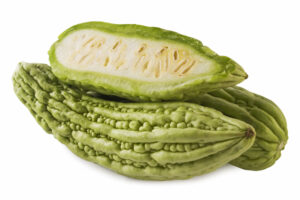Dogs love to get into grocery bags and pantries, and while it can make for a bit of a comedic scene, there are some food items that can be toxic for dogs.
If your dog has managed to get into your food at home and has eaten some bitter melon, you might not know whether this is dangerous for them or not.
So, can dogs eat bitter melon? Unless your dog is pregnant or taking medication for diabetes, they can eat bitter melon without the seeds or rind. However, it is not recommended that it be fed to them daily. Your dog might try out a bite of bitter melon, but chances are they actually won’t enjoy the bitter taste.
To learn more about whether or not bitter melon is okay for dogs to eat, and if you should worry if your dog has got into any, keep reading!
What Is Bitter Melon?

First off, in order to know whether or not to introduce a food to your dog, it pays to know a little more about it. Bitter melon, also known as bitter gourd, is a tropical vine that is used in Asian cuisine.
It comes from the same family as cucumbers, gourds, and squash. It has a crunchy husk, similar to that of green pepper, and is quite watery, similar to a cucumber.
The alkaline, bitter taste is unlike any other vegetable, and it actually becomes more bitter as it ripens.
Can My Dog Eat Bitter Melon?
Bitter melon, like some other melon types (not all), is not toxic for dogs in general and is safe for them to eat on occasion. However, we have to note here that if your dog is pregnant or taking medication for diabetes, bitter melon can lead to miscarriage or hypoglycemia. Otherwise, it should be alright for your dog in small quantities.
The flesh of the bitter melon, as the name describes, has a bitter taste, which your dog might not enjoy as much as if you had given them a slice of sweet melon.
The one problem with feeding your dog bitter melon, and other types of melon, is that the seeds are not so safe for them. The seeds can cause digestive obstructions for dogs, as they will most likely swallow them and not chew them down smaller.
This could then cause severe stomach aches too, as the seeds cannot be digested. If you are going to feed bitter melon to your dog, it is best to remove the seeds first, to avoid any discomfort or pain that they might cause when swallowed.
Other than this, there is not much risk feeding your dog bitter melon on occasion, as long as it does not become a daily inclusion in their diet.
Should I Give My Dog Bitter Melon?
So, as bitter melon is safe to feed to your dog, does it mean that you should necessarily give your dog bitter melon?
There are some reasons why feeding your dog bitter melon is a good idea. It contains nutrients which help to lower bad cholesterol levels and is also high in vitamin C and A, and magnesium.
Bitter melon also has a high fiber content, so as a vegetable addition to your dog’s diet, it does have its benefit.
While bitter melon has these benefits, it is important to note that it should be not fed to your dog too regularly, and it should not take the place of the normal food in their diet. And, as we’ve mentioned, pregnant dogs or those who are taking medication for diabetes should not ingest bitter melon at all. Better safe than sorry!
There is also the fact that your dog might not like the taste of bitter melon at all! When it is raw, bitter melon has a very bitter taste, and there is little chance your dog will actually crave this. If you are adamant about feeding your dog bitter melon, it would be best cooked and mixed into their food.
How To Safely Feed Bitter Melon To Dogs
If you are going to feed bitter melon to your dog, then you need to be sure to do so safely. There are some great benefits from feeding your dog bitter melon, as long as you prepare it for them properly.
When feeding your dog bitter melon, it is best to remove the rind and any seeds. Only the flesh should be given to them, and this should be cut up or mixed into their food so that the taste is not too overpowering for them.
The flesh of bitter melon can either be fed to them raw or cooked, it is up to you how you would prefer to prepare it, and it would also depend on how your dog would like to eat it as well.
Remember that the seeds can cause serious digestive problems for your dog, as they cannot be digested and they might become lodged in their digestive tract, which can be so painful for them, and which can lead to some serious medical issues too.
The rind should not be fed to your dog because it can be quite hard and unpleasant to eat, and it is also very bitter. Having the rind included in the meal will just make it quite a bitter meal for them!
How Much Bitter Melon Can Dogs Have?
Bitter melon should not be fed to your dog daily. There are other food options, specifically designed for a dog’s diet, that should take preference over adding in certain items like bitter melon, which is not a part of their natural diet.
There is not one hard rule on how much bitter melon a dog can eat, as it would depend on their taste and their size as well. A larger dog would be able to eat more bitter melon than what a smaller dog would.
A general rule is to offer them a small amount of bitter melon 2-3 times a week at most. It would probably be best to start cooking the bitter melon and adding it into their food, so they become accustomed to the taste slowly over time.
Bitter melon should only be offered as an addition to a meal, or as a snack if for some reason your dog loves the bitter taste, and should not take away from any other essential items in your dog’s diet.
Always speak to your vet before introducing a food such as a bitter melon to your dog, just to be sure that it is safe for them, and that it won’t create any health issues. This is especially important for dogs who have current health conditions.
Why Too Much Bitter Melon Is Bad For Dogs
Too much bitter melon can be dangerous for dogs. While bitter melon itself isn’t toxic, it is not a part of their natural diet, and should not take the place of any other food that would be given to them daily.
One such concern with bitter melon is that it has a low sugar content, so feeding a dog who is already on diabetes medication a bitter melon-rich diet could see to their blood sugar dropping too low, which could lead to hypoglycemia.
Hypoglycemia in dogs is a serious condition and can present as fainting, dizziness, and further medical issues. A dog needs a well-balanced diet, and while they do not need a large amount of sugar, bitter melon has nutrients that significantly reduce glucose levels.
The Benefits Of Bitter Melon
Bitter melon has some great benefits for dogs and humans alike, and while it should not become a large part of your dog’s diet, it can have some good benefits. If you are cooking up some bitter melon at home for yourself, then you can mix a bit in with your dog’s food that night.
These are some of the benefits of bitter melon:
- Good source of fiber, vitamin C, vitamin A, potassium, zinc, iron, magnesium, and fiber
- Contains nutrients that can help reduce blood sugar (not good for dogs already taking medication for this purpose)
- Contains certain compounds which help to reduce bad cholesterol levels, boosting overall heart health
- Low in calories and high in fiber, which can aid with weight loss
Recap
Dogs should be on a balanced, healthy diet, and any other extras added in should be researched thoroughly by pet owners.
One such item you might want to add to your dog’s diet is bitter melon. While it might not be the best-tasting food in the world, it can bring about some great benefits that could boost your dog’s health.
Bitter melon is not toxic to dogs, although when feeding your dog bitter melon, you should remove the seeds and the rind. It should only be offered 2-3 times a week at most and added in to their regular food.
And, of course, never feed a dog who is pregnant or on medication for diabetes bitter melon.
Related Questions
Can dogs taste bitter food?
Dogs have four tastes just like humans – sweet, salty, sour, and bitter. They also have the ability to taste water, which humans do not have. While their responses to these tastes might differ from humans, they can definitely taste them.
Which fruits are dangerous to feed to dogs?
You should always double-check what you are thinking of feeding your dog. Certain fruits such as grapes, currants, raisins, avocados, cherry pits, lemons, oranges, and apple seeds are all dangerous for dogs, and should not be given to them at all.
Up Next: Is Liverwurst Good For Dogs?
